Retired Korean women’s doubles star Kim Min Jung talked to Badzine earlier this month about her career’s high points and its low points, about her retirement and her plans for life after international badminton.
By Don Hearn, Badzine Correspondent. Photos: Don Hearn and Badmintonphoto
Two-time Olympian Kim Min Jung of Korea has retired from international competition at age 26. When she decided, earlier last year, to make the Olympics her last international tournament, she may have thought she would be remembered for having reached #2 in the world in women’s doubles, for winning the Uber Cup, for being one of only four people to have beaten the mighty Wang Xiaoli and Yu Yang, or perhaps even for an even bigger accomplishment that she might achieve at the London Olympics.
As fate would have it, though, her career ended on a real low as she was one of eight players disqualified from the Olympics for playing to lose their last round-robin matches. With that unfortunate development, and the subsequent banning of the four Korean players from the Korean National Team by their own Badminton Korea Association (BKA), Kim’s decision to hang up her National Team uniform was less surprising.
However, Kim Min Jung herself tells a different story of her plans for life after two Olympics.
Badzine: First off, what prompted you to retire?
Kim Min Jung: Actually, even before the Olympics, I had originally planned for that to be my last tournament. Were I to keep playing until the Rio Olympics, I would be playing at age 30 and I think that would be difficult. I’ve been playing since I was eight years old.
Badzine: Was Ha Jung Eun aware that the Olympics would be your last run together? Had you already discussed it with her?
Kim: Yes, Jung Eun knew that I would be retiring. She herself did not plan to but with all that happened, I think she’s just going to play with her pro team. Still, I don’t really know what she’ll end up doing.
Badzine: What would you say was the biggest win of your career?
Kim: When Jung Eun and I beat Wang Xiaoli and Yu Yang, that was a huge win for us but as you know, we didn’t win the title that time so the Uber Cup, when I played with Lee Hyo Jung and we won the Cup, that is, I think, my most memorable victory.
Badzine: Not only have you, personally, been involved in the only two times when Wang Xiaoli has lost to Korean pairs but also you and Ha Jung Eun one of only two pairs to have beaten Wang Xiaoli and Yu Yang. Do you feel proud to hold those distinctions?
Kim: It feels good to have that experience. In any case, up until last year, Jung Eun and I hadn’t beaten any of the top Chinese pairs so we really wanted to achieve that before going to the Olympics and trying for a medal. Then we were able to do it at home at the Korea Open so we were so elated with that win.
Badzine: Everyone who plays against Wang Xiaoli in women’s doubles also plays mixed against some of the top men. In light of that, is Wang’s smash really that strong?
Kim: Well, yes. Her smash really is that strong. Okay, of course it is still harder to return some of the men’s smashes in mixed doubles but Wang Xiaoli smashes once and then she recovers so fast to get ready to smash again. In mixed doubles, quite often when we return a man’s smash, the next thing we worry about is the woman at the front intercepting so often the man only has to smash once.
With Wang Xiaoli, she is able to keep on smashing. Also, the Chinese players, in general, are all strong and have hard smashes but not all of them can drop so effectively but Wang Xiaoli has an excellent drop shot, too, so we have to be ready to move forward for that as well as prepare for her attacks and that makes her very difficult to play against.
Wang and Yu are strong and they’re fast and it’s also that they and all the Chinese players, they don’t make a lot of mistakes so you don’t get any points without earning them. Tian Qing and Zhao Yunlei are that way, too, but their style is very different. Their strong point is their shot-making. With Wang and Yu, the fact that they attack so well makes their opponents more nervous and that means even more errors.
Badzine: What about you personally? What is the strongest part of your own game?
Kim: My own best shot is my drop shot. It is my best shot, although it still isn’t always good enough to beat the Chinese players. The other thing I do well is that I am fairly consistent.
Badzine: Doubles in badminton is less about pairing the two best players and more about finding the chemistry for two players to play well together. In this sense, are you satisfied with the partnerships you had in your international career?
Kim: I did win two titles with Lee Hyo Jung but then she retired soon afterward so for most of my career, Ha Jung Eun was my partner and I think we made a very good team. I’m really grateful that I was able to play with her.
Badzine: When the BKA announced its decision to ban you and your team-mates in August, Badzine ran a poll in which nearly 9 out of 10 voted that the punishment was too harsh and most of those thought no additional punishment should be given. In other words, it seems our readers generally support you and I’m sure many would like you to see you play longer. What is your reaction to that?
Kim: I am, of course, grateful for the support. I, too, think that the punishment from the BKA was too harsh. As for me playing longer, I don’t think I can.
Badzine: Do you feel that you and the other seven players were guilty of any wrongdoing during the Olympics? Since then, a lot of people have come out and put the blame solely on the tournament structure.
Kim: I don’t know what most people’s opinions are but in my case, I think that the tournament structure was a problem.
Badzine: What feeling is foremost when you reflect back on what happened? Is it embarrassment? Is it guilt? Is it disappointment in the guidance of your coaches? Or is it resentment at the way the rules were designed?
Kim: Well, first, I think the rules were a major problem and if badminton is played in the Olympics again, I really think they need to be changed. The way the tournament was structured, it was basically unacceptable.
I can’t help thinking that if anyone else were in our position, they would have made the same choices. We really had in mind meeting Wang Xiaoli and Yu Yang in the final and that’s why we needed to lose that match. If we had beaten the Indonesian pair, we would have had to play them in the quarter-finals.
So we basically had a choice between playing the top Chinese pair in the quarter-finals and playing them in the finals and that all depended on the outcome of our last group match so that choice was obvious. I don’t feel that the tournament setup gave us the option to decide otherwise.
As for our coaches, I don’t blame them at all. I think the tournament was badly designed and I think that the punishment was too harsh.
Badzine: In the past, it was not uncommon to see Korean women retiring at age 26 or even earlier; however, it’s not so common any more. Is it not difficult for you to give up the game now? After all, you are still young and in your prime and this is when you’ve been playing your best badminton.
Kim: Well, that’s true but still, when I left the national team, I was the oldest player there. Besides, I haven’t completely stopped playing badminton. I’ll still be playing with the Jeonbuk Bank team. I think I can be satisfied playing only in domestic tournaments.
Badzine: A lot of retired Korean players I’ve talked to have stressed that being with their pro teams is a much more relaxed environment. Do you feel that way with the Jeonbuk Bank Badminton Team?
Kim: Oh yes, it’s very relaxed playing for a pro team. But by that, I don’t mean that because it’s so tough training with the national team I don’t want to train there. Rather, when you’re on the national team and living in the national training centre, you don’t have the opportunity to do anything but badminton. It’s a little bit more flexible when you’re just playing for a pro team.
Now here I am, still in my twenties but not for that much longer and I like the fact that I have the chance to look for more out of life.
Badzine: What types of things are you interested in trying that are not necessarily related to badminton?
Kim: Well, for one thing, I’d like to travel. I also like having the opportunity to get to know my team-mates here better.
Badzine: I suppose as a player, you went to a lot of countries but it hardly qualifies as travel. Are there any places you went to play that you’d like to see more of as a traveller?
Kim: One place I’d like to travel around is Japan. Of course, I went there as a player but that’s not the source of my interest. I have always been fascinated with the place, since I was little, and lately, I’ve been learning Japanese and I have plenty of Japanese friends. Actually, I’d really like to live there, too: Tokyo in particular.
Badzine: That sounds like it would be a big change. Where all have you lived so far?
Kim: My experience living different places has been limited to Cheju Island until high school and then Seoul when I was on the national team and now Jeonju. Living in Seoul was okay but I’d really like to get the chance to live in Japan.
Badzine: You’re living in Jeonju now while playing for the Jeonbuk Bank team. How long do you think you’ll stay with this team?
Kim: I see myself playing with my pro team for one more year.
Badzine: Really? And what is your plan for one year from now?
Kim: Well, I’m thinking of doing something else but for now, it’s a secret.
Badzine: Will we not see Coach Kim Min Jung, then?
Kim: I could see myself coaching, too, at some point. Actually, to be honest, when the Olympics finished, I just took a break for a while and I really thought that I would try something different, away from badminton. I thought I could even make a career change.
I started studying fashion design but it turns out that it would be a lot more complicated than I expected to make that kind of career change so I have since given it up. I think that my future still lies with badminton.
Badzine: Who would you say are your favourite badminton players?
Kim: Korean or worldwide? If we are talking worldwide, I’d like to name two players: Wang Xiaoli and Yu Yang. When I was younger, actually, I was a fan of Yu Yang. She is very strong mentally. And as for Wang Xiaoli, I think she is a very skilled player.
Badzine: What about your favourite Korean player, then?
Kim: A Korean player? Well to choose a female Korean player, regardless of the discipline, I’d choose Sung Ji Hyun. She is still very young, she is tall, and she is really getting good results these days.
Badzine: What memories of your badminton career do you think you will cherish the most?
Kim: If I think of results, my most cherished memory is definitely winning the Uber Cup. But also, I’ll always remember the ways that being an athlete has changed me, my personality.
Before, I think I tended to give up on things rather easily, when I got tired of them. My life in sports taught me patience and perseverance and the desire to win and that’s something that I value.
![Kim Min Jung puts international badminton behind her Retired Korean women’s doubles star Kim Min Jung talked to Badzine earlier this month about her career’s high points and its low points, about her retirement and her plans for […]](http://www.badzine.net/wp-content/uploads/Newsflash-thumbnail.png)
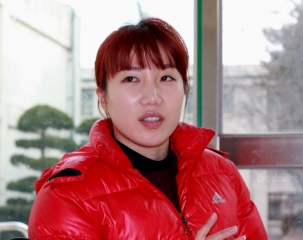
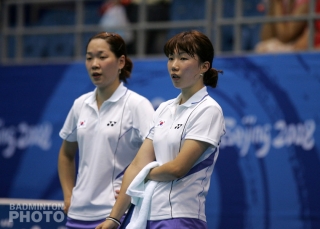
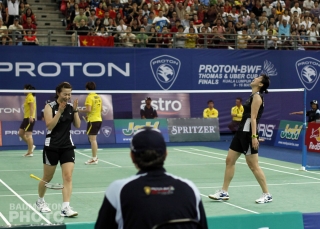
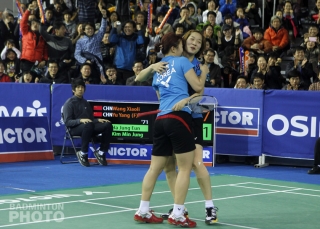
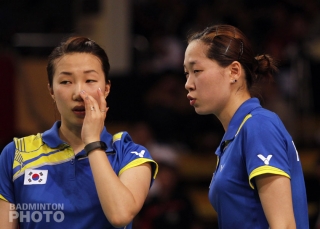
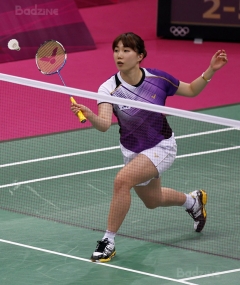
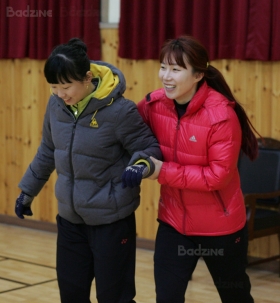
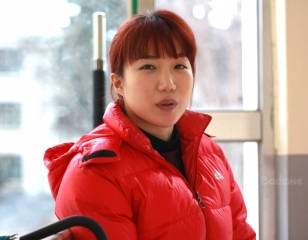
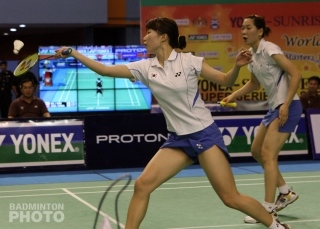
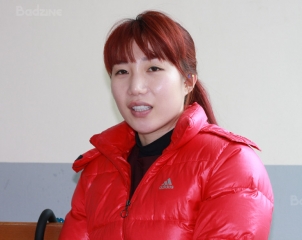
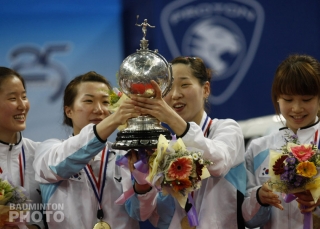

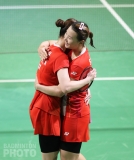
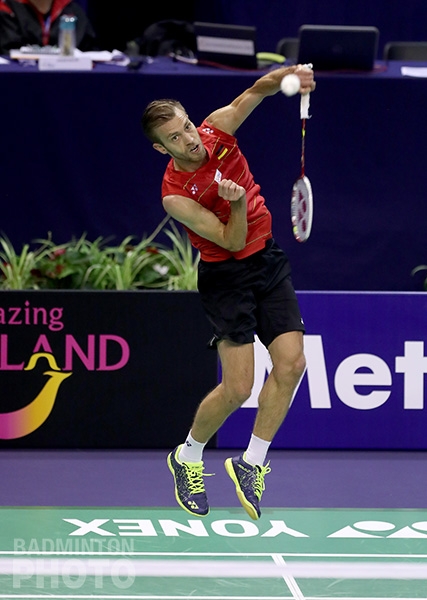
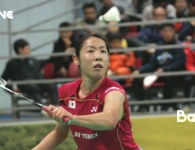
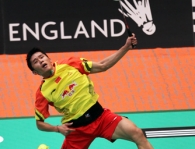
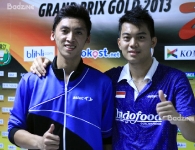
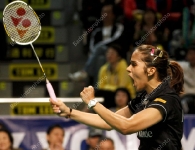
Leave a Reply